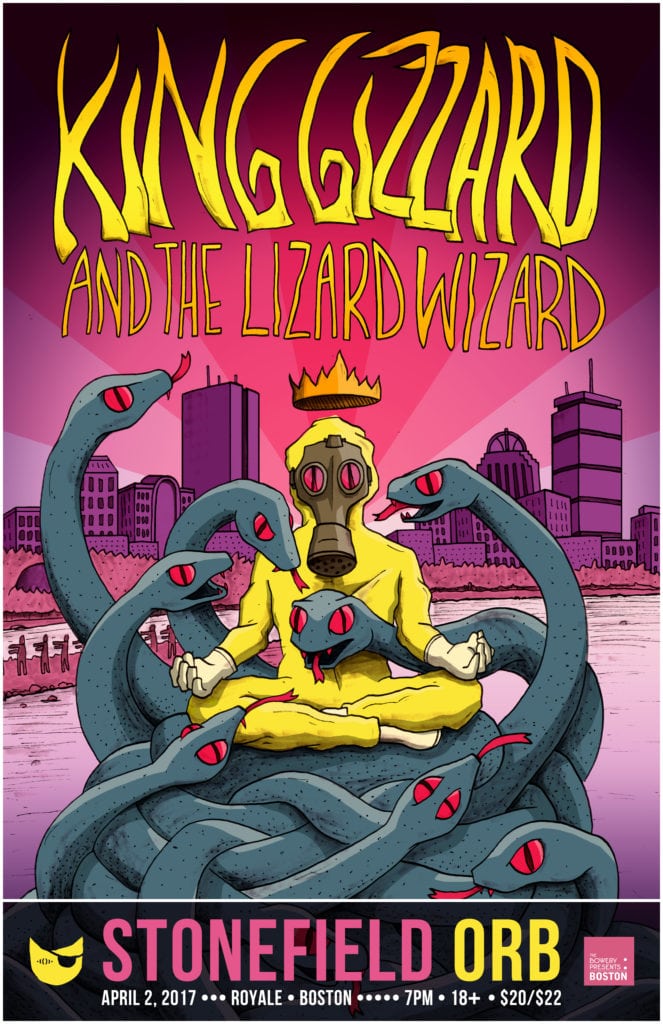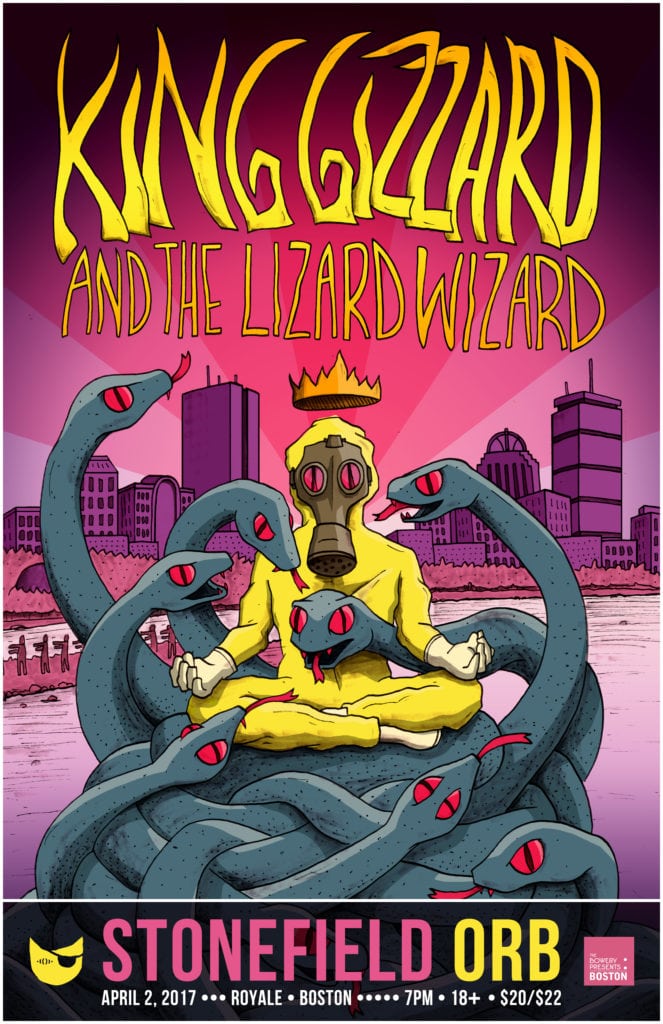Bowery Boston presents
Doors: 7:00 pm / Show: 8:00 pm
This event is 18 and over. Patrons under 18 admitted if accompanied by a parent or legal guardian.
SOLD OUT
***
King Gizzard and the Lizard Wizard
[Website] [Facebook] [Twitter]
“Nonagon infinity opens the door,” sings Stu Mackenzie, frontman of Australian psych-rockers King Gizzard & The Lizard Wizard. It turns out, though, that once the door’s open, it never closes. That’s because the Melbourne septet has ingeniously crafted what may be the world’s first infinitely looping LP. Each of the nine, complex, blistering tracks on ‘Nonagon Infinity’ seamlessly flows into the next, with the final song linking straight back into the top of the opener like a sonic mobius strip. It’s exactly the kind of ambitious vision that prompted Rolling Stone to dub the band “one of the most compelling collectives of art-rock experimentalists in recent years.” But far from a simple conceptual experiment, the album is both an exhilarating shot of adrenaline and a remarkable feat of craftsmanship, the result of painstaking planning and an eye for detail years in the making.
The roots of ‘Nonagon Infinity’ stretch back to 2014, when King Gizzard recorded their critically acclaimed album “I’m In Your Mind Fuzz,” which was hailed by Pitchfork as “dense, intricately crafted, and most importantly, powerful.”
“We actually wanted to do this with ‘Mind Fuzz,’ but it just didn’t work,” explains Mackenzie. “We ended up writing songs that needed to be on that record but didn’t connect to the others, so we had to abandon the idea, but the seeds were sown.”
To an outsider, it may have seemed like the band had completely given up on the concept, as the ever-prolific group quickly followed ‘Mind Fuzz’ with two more records in 2015, ‘Quarters’—described by The Guardian as “the neon intersection of DIY psych and 1960s beach pop”—and the stripped-down ‘Paper Mache Dream Balloon,’ which earned praise from NPR to Stereogum. The truth, though, was that King Gizzard was honing in on the ‘Nonagon Infinity’ material the whole time, test-driving various tracks in their explosive live shows to prep for the monumental task of stitching them all together into one searing, multi-movement epic.
“We really wanted to focus on things that felt good live,” says Mackenzie. “We’d grab a little riff here or a little groove there, and we’d jam on them and form songs out of them, which was the opposite of ‘Paper Mache,’ where we were making songs in an acoustic, classic-songwriting kind of way. I wanted to have an album where all these riffs and grooves just kept coming in and out the whole time, so a song wasn’t just a song, it was part of a loop, part of this whole experience where it feels like it doesn’t end and doesn’t need to end.”
Recorded at Daptone Studios in Brooklyn, the final result is an intricate and immersive listening experience. Lyrical refrains and musical motifs establish themselves and then submerge beneath the chaos, only to resurface unexpectedly later like familiar companions on a labyrinthine journey. Motorhead-grade riffs give way to King Crimson and Yes-levels of prog complexity, as songs churn through unusual time signatures and shifting rhythms with blunt force, laying waste to everything in their path.
“I wanted it to feel like a horror or sci-fi movie,” explains Mackenzie of the album’s dark overtones. “The lyrics came as a stream of consciousness, all of these elements just falling out of my head as it was happening.”
“Big Fig Wasp” references a particularly macabre insect that must kill itself in order to perpetuate the species, while “Gamma Knife,” with its 11/8-time drum solo, is named for a surgical tool that burns cuts into the skin, and “People-Vultures” plays like a sinister film soundtrack. Album opener “Robot Stop” pulls more directly from the band’s recent experiences, inspired in part by their relentless work ethic and tour schedule, which has included festival performances at Bonnaroo, Glastonbury, Montreux Jazz & Roskilde as well as countless sold out dates in rooms across the USA, UK, Europe and Australia.
“That song’s about feeling overworked, like a bit of a robot that’s just going to crash and die or something,” he says with a laugh. “But you get yourself up and do it again and you robot on and you’re alright. It was one of the early ones we wrote for the record, and I think when that song came together, everybody started to feel like were going to actually be able to pull off this never-ending album idea.”
To say they pulled it off would be an understatement. The record is a force to be reckoned with on par with the road trains Mackenzie references in the album’s final track.
“In the Australian desert, in the outback, there are what’s called road trains, which are these massive trucks pulling heaps of carriages that can end up being 50 meters long,” he explains. “They drive on the road really, really fast, and they’re deadly, with these bars in the front to kill kangaroos and anything else in their path.”
‘Nonagon Infinity’ has opened the door for King Gizzard & The Lizard Wizard, and they’re barreling ahead with more momentum than ever before now. Much like those road trains, with a band this good, the safest place to be is onboard.
King Gizzard & The Lizard Wizard are:
Stu Mackenzie – Guitar, lead vocals
Joe Walker – Guitar, vocals
Eric Moore – Drums
Ambrose Kenny-Smith – Harmonica, vocals
Lucas Skinner – Bass
Cook Craig – Guitar
Michael Cavanagh – Drums
***
ORB
Playing dark, sonically massive guitar-based rock that’s heavy without sounding excessively metallic, ORB (not to be confused with the influential electronic group the Orb) hail from Geelong, Victoria, Australia. The group was founded by guitarist and lead singer Zak Olsen, guitarist and bassist Daff Gravolin, and drummer Jamie Harmer. The three musicians lived not far from one another, and with some extra time on their hands, they began jamming regularly. Inspired by their youthful enthusiasm for hard rock and early metal bands ORB started as an exercise in fuzz and alternate tunings with a drive to challenge the style they were used to playing in other projects.
Their first full-length album, Birth, was released in July 2016 by Flightless & Anti-Fade in Australia and by Castle Face in the United States and Canada.
***
Stonefield
[Website] [Facebook] [Twitter]
It all started in a shed.
More specifically, it started in a shed on a family hobby farm in a tiny rural township in Victoria, Australia.
The four Findlay sisters, who’d go on to become the earthen psych-rock opal that is Stonefield, had been granted their wish of a drum kit by their parents, whose Zappa, Hendrix and Zeppelin records had long been the shared soundtrack of the household. Amy – the oldest Findlay, though at that time just 15 – took a particular shine to the kit and soon began lessons, her practice sessions echoing out across the family’s acreage. It wasn’t long, however, before her sisters were drawn back into the shelter as, one by one, they found their own instruments to wrangle with. Hannah, then 13, started on guitar. Sarah, 12, took on the keyboard. Holly, just seven years old, listened in on her sisters practising and, perhaps hearing that something was missing, asked her father for a bass.
Now the question is: listen to Stonefield and try to figure out what else the Findlays could possibly be doing.
Stonefield’s first song ‘Foreign Lover’ was recorded for a project Amy was working on as part of her tertiary studies. When they arrived home from the studio that day, the siblings’ mother suggested they enter the track in triple j’s Australia-wide unsigned band competition, Unearthed High. The deadline for entries was that night. They weren’t convinced they had a chance, but decided to give it a shot.
Soon enough, ‘Foreign Lover’ was all over triple j, followed shortly by infectious rock stomper ‘Through The Clover,’ the song they were given the opportunity to record as part of the competition’s first prize. Stonefield was invited to showcase at the inaugural One Movement music and arts conference in Perth, which resulted in [renowned band booker] Martin Elbourne, inviting the band to play the 2011 Glastonbury Festival on the spot.
Over the next two years, the girls wrote and released their second EP Bad Reality. They released their debut self-titled album in October 2013. It entered the AIR charts at #6 and the ARIA charts at #21. The three singles released from the album, including Put Your Curse On Me, received immense support from triple j, and the Southern Cross Network, including MMM.
The album was well received by both the industry and general public. Such was the demand that Stonefield embarked on a national tour, spanning 22 dates and 5 states. The second single Love You Deserve, took up a life entirely of its own, and the band set out on yet another tour.
By this time, the international market had caught wind of the incendiary band from rock journo heaven, and the girls headed to the UK during May to play showcases, as well as Dot to Dot festivals across the UK. In November 2013, Stonefield won the inaugural Age Music Victoria Award for Best Regional Act.
After a huge amount of touring the country last year, 2015 kicked off with the band being awarded ‘APRA Rock Work Of the Year’ for their song ‘Love you Deserve’. Stonefield have secured the support slot for one of their idol bands Fleetwood Mac’ later this year. Finally at home the girls have spent this year working on their second album; produced by Australian music legend ‘Kram’ from Spiderbait. The first taste ‘Golden Dream’ is an exciting glimpse of the new music to come.







